Check out some books by your tutor Fiona Veitch Smith … (click on the book covers to find out more)
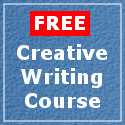 Hello everyone, welcome to the first session of our free online creative writing course. Over the next eight sessions we will be looking at different aspects of creative writing and trying our hand at various forms. I’d strongly encourage you to have a go at the exercises along the way, and please feel free to leave comments or ask questions at the end. If you have arrived on this page without first reading the home page and frequently asked questions page (on tab above) please go back and do so now. If you have read them, enjoy the course!
Hello everyone, welcome to the first session of our free online creative writing course. Over the next eight sessions we will be looking at different aspects of creative writing and trying our hand at various forms. I’d strongly encourage you to have a go at the exercises along the way, and please feel free to leave comments or ask questions at the end. If you have arrived on this page without first reading the home page and frequently asked questions page (on tab above) please go back and do so now. If you have read them, enjoy the course!
Creativity and Art
What is creativity? The Collins dictionary defines it as ‘the ability to cause something to exist’. Without getting into too much of an existential discussion, I would say that with every thought that is expressed, something has been created. It was Descartes who said: ‘I think, therefore I am’; well I would add, ‘I think, therefore I create’ (do you feel a God complex coming on?). But how do we express our thoughts? Sometimes we do it verbally, other times by body language and still again through what is loosely termed ‘art’.
Art takes place when a thought is expressed and fixed in a way that other people may experience it on an aesthetic level – through music, writing, painting, sculpture, choreography and so on. Many artists say that their best work takes place when they ‘by-pass’ the thought and simply express the feeling. This may be true, but for writers, who use a verbal medium, a feeling must first be converted into a thought before it can be put into words. Don’t over analyse the thought before you express it, as this way you can ‘channel’ the purest interpretation of the feeling, but some cognitive process needs to take place. Some writers prefer to mull over a thought and give it form before they put pen to paper – I’m one of them – but it’s good practice to try and switch off the ‘editor’ at least for the first draft. First response trigger exercises are useful in this regard and can release some unexpected words and images.
Exercise 1:
Write down your first response to these words or phrases:
- Blue ball
- And that’s when the sadness came
- Coffee
The first task of a good writer is to convert feelings into thoughts and then into words. This is the raw material that can then be converted into something more permanent. Some writers refuse to toy with their first drafts, believing their creativity will be diluted; I disagree. Allowing your critical mind to improve a piece of writing is where the craftsman meets the artist. Something produced only by the former will lack soul and something by the latter will lack form. Good writing is a combination of art and craft.
For public consumption
Art, of course, is highly subjective and one woman’s masterpiece is another woman’s unmade bed. We all have the ability to create, but whether or not our creation is ‘art’ must be left to the eye or ear of the beholder.
In this session we will look at how you can craft those creative thoughts into creative writing to share with other people. And that’s what sets ‘public’ writing apart from ‘private’ scribblings – there’s a perceived readership in mind. When I ramble on in my journal, I am the only one who will read it (hopefully!) so my only concern is getting my thoughts down on paper. The moment I want someone else to read it I begin to consider ways to improve the presentation and craft it into something more aesthetically pleasing. I consider which words may sound more colourful, whether or not my sentence structure is grammatically correct, whether I’m using evocative imagery, and so on.
Story, feeling or image?
What is it about those creative thoughts that you think might be of interest to other people? Do they speak of an eternal truth or a common experience? Do they make you laugh or cry? Do they suggest a story that will entertain or a poem that captures a moment that must be shared?
Exercise 2: In 50 words or less write down why you want to write then list three creative thoughts that you’ve had lately (each 10 words or less). These may be an image, a musing, a ‘truth’, a story, or so on. If you haven’t had any, take yourself for a walk and look around; what grabs your imagination? Browse through a newspaper or a magazine; do any stories or pictures catch your attention? Think back over your day; did anything funny, charming, shocking or unusual happen to you or someone you know?
Poetry or prose?
Some people are more suited to writing poetry than prose and some people do well at both. Although we won’t be discussing it in this course, other people are more suited to script. I’m one of them. I’ve had relative success as a prose writer and in fact have managed to earn a living from it, but it’s taken years of hard work to get to this point. I recently branched out into scriptwriting and found that I had much more of a natural ability. (If you’re interested in finding out more about scriptwriting, check out getting started in playwrighting). You may find that you’ve been trying to make it as a poet when actually you’re more suited to prose. Now I don’t want to pigeonhole anyone, but ask yourself the following questions:
- Are you more attracted to films than stills?
- Do you enjoy telling people ‘stories’ from your life?
- Do you prefer to read stories or poems?
If yes, to these, then you may be more suited to prose than poetry. If no, then the opposite may be true. If it’s ‘sometimes yes, sometimes no’ then perhaps you are suited to both. We shall be looking at how to write poems in more detail in session 7, but suffice to say, a poem is like a snapshot of a moment. If you can’t rest until you know what happened before and after, then prose may be your genre.
Exercise 3: Take one of the three creative thoughts you wrote down in Exercise 2, then list 20 separate words that communicate or describe that thought. Do not, at this stage, link the words into sentences. Once you have your 20 words use them in a poem of 16 lines or less. Then, take the same 20 words and work them into a short story of under 300 words. Which exercise came more easily? Which form has best communicated your creative thought?
Further Resources:
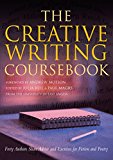
There are some excellent resources out there for creative writers. To get quick ‘starter’ images when your own well is dry I recommend The Writer’s Block by Jason Rekulak. I’m currently working through The Creative Writing Coursebook by Julia Bell and Paul Magrs and finding it very useful.
The next creative writing course session is how to write a short story. But before you move on to that, please feel free to leave a comment or ask a question in the box below.
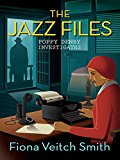
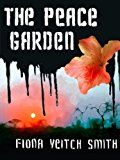
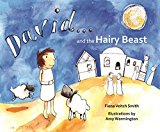
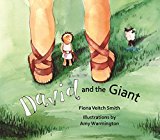
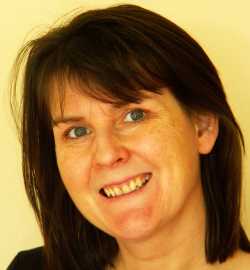 Welcome to The Crafty Writer's free online creative writing course, presented by Fiona Veitch Smith, a freelance journalist, editor, author, playwright, screenwriter and writing teacher. I hope that you'll see a dramatic improvement in the quality of your writing as you work through this course.
Welcome to The Crafty Writer's free online creative writing course, presented by Fiona Veitch Smith, a freelance journalist, editor, author, playwright, screenwriter and writing teacher. I hope that you'll see a dramatic improvement in the quality of your writing as you work through this course.
Goodmorning! I have just finished the lesson and you have giving me some great ideas! Thankyou
you’re welcome, Cindy.
This information that you have shared is very interesting and it caused me to contemplate on the first three assignments. I have always felt a beckoning within me to write, but never knew where to start.I had a flair when I was younger when my imagination was fresh now It takes more thought than it did when I was younger. My father and brother have done writing as a favorite pastime.
I just read this first lesson and completed the exercises. They are a wonderful antidote to the writer’s block I have been dealing with. I am a poet and short-story writer. I have been in a rut since I have been recovering from a surgery and preparing for a second surgery. It is exciting to learn about creativity. I want to explore the topic further. Thank you for this course.
You’re welcome Dina. Glad the pipes are unblocked now. And all the best for the second surgery. Is that a mixed metaphor?
So far so good. I am actually trying to write in my own language (bengali). I am eagerly waiting to see what unfolds in the next sessions.
Hi Imtiaz. I’m so glad you’re writing in Bengali. I believe you will get the most out of this course writing in your ‘heart’ language.
I want to be a writer because lecturers in my university always tell us that we don’t deserve to be a literature students so I want to prove that I am capable of producing a literary work ,and I am intend to start my career with a short story.furthermore I want to set my hidden feeling free by transform it into thoughts and later to prose.the thing is I speak english as a second language .do you thing that I am capable of challenging?
Hello GAE. I always advise students to write in their first language and then translate into English afterwards if you want to be published in an English-speaking country. If you want to do that I suggest you try to improve your written English first as this does let you down. This does not mean however that you are not a good writer and you should carry on developing your craft.
Hello Fiona. Having just arrived at your site and taken my first stroll through the house I do commend you – you have faithfully responded to comments since 2007. That deserves a mention. At 74yrs of age the action of writing has been a wee while arriving. The desire has always been with me – the belief that I could, well that is still lagging a little BUT, this afternoon as I worked on one of your exercises I discovered something. Watching the ink flow from this stick-like object in my hand, seeing the loops and swirls – the dots and crosses, filled me with immense pleasure. It wasn’t what I wrote but watching the writing happen that gave me such enjoyment. Hopefully it makes sense somewhere. Thank you for the course and for its possibilities.
Dear Gabbie, yes it can be a little trying responding to some of the more ‘inane’ comments, but people like you make it worth my while. What a wonderful testimony of the power of creativity. I hope you have many more years in which you continue to experience the joy of writing.
All the best
Fiona
Thank you for this course it’s becoming very helpful as I’m finally owning up to my calling as a writer which I have been since I was able to tell stories then when I learned to write. I wrote my first UNPUBLISHED book at age 6. I want to know how I can go further than my own notebooks and laptop wordpads? How do I begin using it toward a career goal?
Hello Courtney, if you work through the course there will be a session at the end with suggestions on how to take your writing further. You may also want to start making money from writing non-fiction articles. If so, try out my free non-fiction writing course http://non-fiction-writing-course.thecraftywriter.com/
I have always wanted to write. The times that I have tried to write for an essay I feel blocked. These three exercises really helped me, I started writing all that came to my mind. At times I felt a block but quickly bounced back and kept writing. I look forward to reading the rest of the course and releasing my creative side. Thank you
Thanks for a wonderful course.
I too have a great belief that education in all forms should be free..
I love to write, but have been so afraid of opening up my mind and thoughts to others, for fear of failure and criticism.
I loved these exercises, they have definately given me so much freedom to explore writing.
I was surprised that I found the poetry to be an easier method of expressing my thoughts!
Your course has a wonderful format that appeals to my systematic mind!
I am really looking forward to doing the remaining exercises, but will pace myself to get the maximum benefit!
You’re welcome Caroline. I also found the poetry exercise liberating when I first encountered it which is why I included it here. I hope you enjoy the rest of the course.
I swear I can not write a poem if my life depended on it. I love writing stories though!!! I gave it a shot anyway and this is what i came up with:The farther I swim, the bigger the waves
They become hungrier and hungrier until they cave
Crashing down on me, the victim, of their rumbling stomach
Swallowing me as I tumble through an old ship’s wreckage
I begin to sink to the bottom; terrified as I try to scream one last message
I am suffocated by water as my last breath escapes my mouth
Bubbles form carrying the words back to the beach, “I love you and goodbye.”
As the rumbling of the storm above stops, I die
For a moment my world is empty but then what I see leaves me breathless
Angels are singing out their happiness
In front of me is a throne and I know I have not really died
But that I will now live forever in Heaven by God’s side.
(I don’t even know if this is how you write a poem or if its the right format and punctuation, but i gave it my best shot!)
Hello KitKat, it looks like a poem to me! Don’t stress if you’re not comfortable with poetry. The aim of this exercise was to release your creativity not craft a perfect poem. There will be a session on poetry later in the course that may help you, but feel free to skip it! Happy writing, Fiona.
Thank you!!
I thought KitKats poem was awesome. Mine never developed. A short story is easy.
Well, this is my first serious attempt at a poem so…here goes nothing!
I often wonder why
God gave us such fragile hearts,
and such unfeeling minds
Our Hearts are so full of high expectations and thoughts of true love
such things cannot always be so.
Minds are full of facts and proof,
they cannot let our dreams taint our image of life.
Hearts make it hard to see our reality,
they make our worlds full of dreams and hopes that sometimes cannot be.
But still we protect these fragile things of ours,
even if they will only bring us pain.
Love and Hate are all too similar in the scheme of our hearts
the line between them is sometimes to thin to even see.
but still we protect them, love them. give into it’s wants,
Taking away the power from our head.
Is it better to go by your head, or your heart?
By your head you’d never be hurt; at the same time you’d never feel love.
By your heart you’ll be hurt, it’s all too true. But the love will get you through it.
Maybe if we went by our hearts, the world would be a better place;
then again, it could also be a much more violent place.
So what do you say, you must have some kind of idea
The Fragile Heart?
Or the Unfeeling Mind?
I’m a writer. Plain and simple. Poetry. Songs. Stories. Essays, you name it. Ever since I was a young kid I loved to write. And all through high school as well. It’s probably because I have such an odd and creative mind. lol. But recently -as in the last year- I’ve been blocked and I don’t know why, and it’s extremely frustrating , so I was searching around the web today and I found this, and I have to say thank you! I think it’s helped me alot, and I can’t wait to finish the rest of these and get back to doing what I love. Thanks again
Thanks again
You’re welcome Sarah. Hope the pipes get cleared soon. Happy writing!
can you send me writing couse through the mail
No sorry Linda, it’s an online course only.
Thanks so much for creating this course Fiona and making it available for everyone. I am just dipping my toe into creative writing at the ripe old age of 33 and can’t wait to explore my imagination and create some interesting stories. The exercises are great. I found the poem was slightly easier to write, mainly because it had a definite end I think, as opposed to the story which I wasn’t sure where it was “supposed” to go. Both made me realise I have a long way to go to create something special! Looking forward to continuing the course.
Hi Toby,
I only started taking creative writing seriously (ie trying to write something for publication) when I was 30. So never too late! And don’t worry if you found the story more difficult – it wasn’t supposed to do anything other than help to release your creativitiy. I hope you enjoy the rest of the course.
Happy writing!
Fiona
I have just finished the first three excersises in the course. I am now looking forward to writing more even though im not sure if im any good.I am just not sure how slow or fast i am suposed to go through the course i dont want to rush it.but i look forard to the next step.
Hi Tanya, there’s no right or wrong. Do whatever works for you. Enjoy!
Thanks Fiona for having this course available to us! The exercises were interesting… I found that both the poetry and essay writing came to me with the same difficulty. I don’t necessarily think that either are very good at this time; however, I understand that ‘great writing’ will come with practice and exposure. I can’t wait to see where this journey takes me! My goal is to be able to write a play and/or musical, and even though my head is swimming with ideas, I am having a very hard time putting it on paper.. hence why I am here!
Hello Candy, where are you based? The Open University in the UK has an excellent introduction to playwrighting course which can be taken by correspondence. Not free, of course, but from what I recall it’s reasonably priced.
Fiona,
Thank you so much for sharing your course with us! I have to admit, that the hardest part of Exercise#3 for me was coming up with the 20 words! After that both poem and short story flowed easily. After dabbling with writing most of my life, now at 46 years of age I have decided to try to take it to the next level and realize I need to sharpen my skills. Then I found your site and after just the first lesson I am already finding your methods very helpful! Thank you again!
You’re most welcome Darrell. Yes finding 20 words can be tricky. The first 10 – 12 come fairly easily as they tend to be desciptive. But to get to 20 you have to start thinking laterally and that’s where the real gems are unearthed. I hope you found it was worth the effore.
Happy writing,
Fiona
Hi Fiona
Having just found this site today 12th August 2012 it is a boon to me to be able to receive some encouragement in my quest to be a writer. I have had one poem published, and written others; but desire to begin writing a novel very soon; having many story-lines in my head that need to be committed to print. Obviously I am feeling nervous about starting this process!
A little encouragement goes a long way for most people. Thank you for taking the trouble to open-up this site for beginners. I look forward to continuing this process.
Freda
You’re welcome Freda – and good luck with the novel!